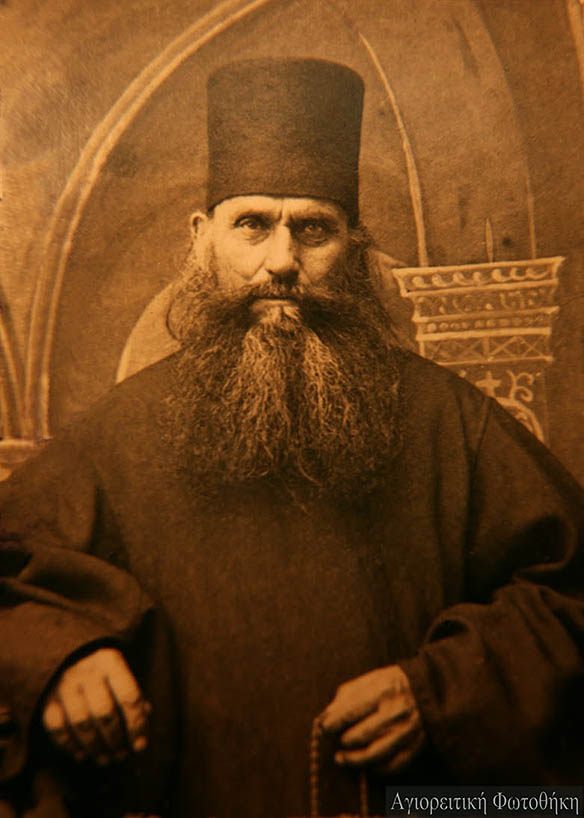Tuesday, May 19, 2015
A Cure for Depression from St. Silouan the Athonite

The greatest plague of the 21st century is not AIDS, nor cancer, nor the H1N1 flu, but something that affects much more people in ways we can barely start to understand: depression. Reportedly one in ten Americans suffers from one or the other forms of this malady. The rates of anti-depressant usage in the United States are just as worrisome. A recent poll unveils that one in eight Americans is using them. Prozac, Zyprexa, Cymbalta are not strange alien names anymore, but familiar encounters in almost every American household. Even children approach the usage rates of adults. These are very high and paradoxical numbers in a country where all are free to enjoy “life, liberty and the pursuit of happiness.”
Even in times of crisis, Americans have a better life than most countries in the world, in all respects. Just glance over to the life of the Christians in the Middle East, and you’ll realize the blessings we enjoy every day. Most of us have a job, a house, a car or two, enough food, education, equal opportunity, religious freedom to name just a few. Practically we shouldn’t be in want for anything; yet, every tenth person is longing for something, is missing something so bad, so important, that they cannot cope with this need on their own. This explains the usage of drugs; with them, the negative aspects of life can be more easily coped with. They are a crutch that helps people move along with their lives for a short while.
But a crutch is still a crutch; it can only take one so far. The depressed man needs a different cure, one that will take care of the root of his problems, will erase his desperation and offer him a new lease on life. A cure, however, cannot come without the understanding of the underlying disease. So, this begs a question: why is America depressed? What are we still missing in the abundance that surrounds us?
A short answer is: we miss God. We may think we miss something else, we can justify our depression by creating some imaginary needs, but at the end of the day, we miss Him. He has created us for a purpose: union with Him unto eternity. Losing sight of this, we lose it all and, in our shortsightedness, we keep longing for something we don’t know we have lost. It all goes back to who we are, what are we doing here and where we are going; it is back to the basics.
In the midst of the information revolution, the world wide web and the boom of technology, man still yearns for the same fundamental things: purpose and direction. The secular society can’t give him either. The purpose is temporary, ceasing to exist when life expires, and the directions one gets are so contradictory that they end up canceling themselves. So man is confused, lost and at the brink of despair. He is thirsty, but there is no well of life, he is hungry but there is no food for his eternal soul, he is lonely and he has no man.
So what to do? In an interview I recently read (you can find it here, it is very edifying), the Archimandrite Sophrony Sacharov, of blessed memory, at that time a younger monk, was asked by a visiting priest: “Fr. Sophrony, how will we be saved?” Fr. Sophrony prepared him a cup of tea, gave it to him, and told him, “Stand on the edge of the abyss of despair and when you feel that it is beyond your strength, break off and have a cup of tea.” Obviously this was a very odd answer, and the young priest was definitely confused. So off he went to St. Silouan the Athonite, who lived not far from there, and told him everything, asking for advice. Long story short, next day, St. Silouan came to the cell of Fr. Sophrony and the two started a conversation about salvation. The beautiful fruit of their conversation was an unforgettable phrase that I would like to also offer as the answer to our conversation today about depression: “Keep your mind in hell and despair not.”
At first glance, St. Silouan’s take on salvation is not less strange that Fr. Sophrony’s initial answer, but it actually makes great sense. In traditional Christianity, the difficulties of life, the hardships are assumed as part of our fallen existence. Our bodies and our minds suffer the torments, but this is nothing but a temporary stage. The ascetic Fathers considered them as tests on par with the athletic exercises, very useful in practicing and improving the powers of the soul like patience, kindness, hope, faith and so forth. We keep our mind in hell when we consciously assume the pain of living in a fallen world, when we learn from this passing agony to avoid the even greater torture of an eternity without Christ. But there is hope in this suffering because Christ himself has suffered them first and has opened for us a way out of despair, a way out of pain, a way out of death. Christ is the well of life, the bread of eternity, and the only Man we need.
So as Christians we keep our minds in hell and we despair not, but courageously give glory to God in all things, even in pain, hoping, always hoping, in our Savior, the only One who can take us out of the brink of despair and set us for a new life in Him. In Him we put our hope, in Him we find our purpose, and on Him we set our goal.
Through the intercessions of our Father among the Saints Silouan the Athonite, through the prayers of Fr. Sophrony of Essex, of all the ascetic Fathers and all the saints, O Lord of compassion and hope, have mercy on us and save us!
St. Silouan the Athonite
http://agapienxristou.blogspot.ca/2014/09/a-cure-for-depression-from-st-silouan.html
http://pemptousia.com/
Source: Myocn.net
Η ομορφιά της αθέατης αγιότητας ( Ἅγιος Πορφύριος )
 Μιά μερα, ένα πρωινό προχώρησα μόνος μου στο παρθένο δάσος. Όλα, δροσισμένα από την πρωινή δροσιά,λαμπύριζαν στον ήλιο. Βρέθηκα σε μια χαράδρα. Την πέρασα. Κάθισα σ’ ένα βράχο. Δίπλα μου κρύα νερά κυλούσαν ήσυχα κι έλεγα την ευχή. Ησυχία απόλυτη.Τίποτα δεν ακουγόταν. Σε λίγο, μέσα στην ησυχία ακούω μια γλυκιά φωνή,μεθυστική, να ψάλλει, να υμνεί τον Πλάστη. Κοιτάζω, δεν διακρίνω τίποτα.Τελικά, απέναντι σ’ ένα κλαδί βλέπω ένα πουλάκι· ήταν αηδόνι. Κι ακούω το αηδονάκι να κελαηδάει, να σχίζεται· μάλλιασε, που λέμε, η γλώσσα του, φούσκωσε απ’ τους λαρυγγισμούς ο λαιμός του. Αυτό το πουλάκι το μικροσκοπικό να κάνει κατά πίσω τα φτερά του, για να έχει δύναμη και να βγάζει αυτούς τους γλυκύτατους τόνους, αυτή την ωραία φωνή και να φουσκώνει ο λάρυγγάς του! Πώ,πώ, πώ! Να ’χα ένα ποτηράκι με νερό, για να πηγαίνει να πίνει και να ξεδιψάει!
Μιά μερα, ένα πρωινό προχώρησα μόνος μου στο παρθένο δάσος. Όλα, δροσισμένα από την πρωινή δροσιά,λαμπύριζαν στον ήλιο. Βρέθηκα σε μια χαράδρα. Την πέρασα. Κάθισα σ’ ένα βράχο. Δίπλα μου κρύα νερά κυλούσαν ήσυχα κι έλεγα την ευχή. Ησυχία απόλυτη.Τίποτα δεν ακουγόταν. Σε λίγο, μέσα στην ησυχία ακούω μια γλυκιά φωνή,μεθυστική, να ψάλλει, να υμνεί τον Πλάστη. Κοιτάζω, δεν διακρίνω τίποτα.Τελικά, απέναντι σ’ ένα κλαδί βλέπω ένα πουλάκι· ήταν αηδόνι. Κι ακούω το αηδονάκι να κελαηδάει, να σχίζεται· μάλλιασε, που λέμε, η γλώσσα του, φούσκωσε απ’ τους λαρυγγισμούς ο λαιμός του. Αυτό το πουλάκι το μικροσκοπικό να κάνει κατά πίσω τα φτερά του, για να έχει δύναμη και να βγάζει αυτούς τους γλυκύτατους τόνους, αυτή την ωραία φωνή και να φουσκώνει ο λάρυγγάς του! Πώ,πώ, πώ! Να ’χα ένα ποτηράκι με νερό, για να πηγαίνει να πίνει και να ξεδιψάει! Μου ήρθαν δάκρυα στα μάτια. Τα ίδια εκείνα δάκρυα της Χάριτος που κυλούσαν αβίαστα και τα οποία απέκτησα απ’ τον γερο- Δημά. Ηταν η δεύτερη φορά που το δοκίμαζα.
Δεν μπορώ να σας μεταφέρω αυτά που ένιωσα. Αυτά που αισθάνθηκα. Σας φανερωσα, όμως, το μυστήριο. Και σκεπτόμουν. «Γιατί το αηδονάκι να βγάζει αυτούς τους λαρυγγισμούς; Γιατί να κάνει αυτες τις τρίλιες; Γιατί να ψάλλει αυτό το υπέροχο άσμα; Γιατί, γιατί,γιατί… γιατί να ξελαρυγγιάζεται; Γιατί, γιατί, για ποιό σκοπό; Μήπως περιμένει να το επαινέσει κανείς; Όχι, βέβαια, εκεί κανείς δεν θα το κάνει αυτό». Μόνος μου φιλοσοφούσα. Αυτό τ’ απέκτησα μετά το γεγονός με τον γερο-Δημά. Πριν απ’ αυτό δεν το έκανα. Πόσα δεν μου είπε το αηδονάκι! Και πόσα του είπα μες στη σιωπή: «Αηδονάκι μου, ποιός σου είπε οτι εγώ θα περνούσα από δώ; Εδώ κανείς δεν πλησιάζει. Είναι τόσο απρόσιτο το μέρος. Πόσο ωραία κάνεις χωρίς διακοπή το καθήκον σου, την προσευχή σου στον Θεό! Πόσα μου λες, αηδονάκι μου, πόσα με διδάσκεις! Θεέ μου, συγκινούμαι. Αηδόνι μου, μου δείχνεις με το κελάηδημά σου πώς να υμνώ τον Θεό, μου λες χίλια, πολλά, πάρα πολλά…».
Δεν είμαι καλά από υγεία, να τα πώ όπως τα νιώθω. Θα μπορούσε να γραφεί ένα ολόκληρο πεζογράφημα. Το αγάπησα πολύ το αηδόνι. Το αγάπησα και μ’ ενέπνευσε. Σκέφτηκα: «Γιατι εκείνο κι όχι κι εγώ; Γιατί εκείνο να κρύβεται κι όχι κι εγώ;». Και μου ήρθε στο νου ότι πρέπει να φύγω, πρέπει να χαθώ, πρέπει να μην υπάρχω. Είπα: «Γιατί; Είχε αυτό κόσμο μπροστά του; Ήξερε οτι ήμουν εγώ και τ’ άκουγα; Ποιός τ’ άκουγε που ξελαρυγγιαζόταν; Γιατί πήγαινε σε τέτοια κρυφά μέρη; Αλλά κι εκείνα τ’ αηδόνια μές στο λόγγο, μές στη ρεματιά που βρισκόντουσαν τη νύκτα και την ημέρα, το βράδυ και το πρωί, ποιός τ’ άκουγε που ξελαρυγγιαζόντουσαν όλα;Και γιατι το κάνανε αυτό το πράγμα; Και γιατι πηγαίνανε σε τέτοια κρυφά μέρη;Γιατι σπάζανε το λάρυγγά τους; Ο σκοπός ήταν η λατρεία, το ψάλσιμο στον Δημιουργό τους, η λατρεία στον Θεό». Έτσι τα εξηγούσα.
Όλα αυτά τα θεώρησα οτι ήταν του Θεού άγγελοι, δηλαδη πουλάκια που δοξάζανε τον Θεό, τον Πλάστη των πάντων και δεν τ’ άκουγε κανείς. Ναι, κρύβονταν, να μην τ’ ακούει κανείς,πιστέψτε με! Δεν τα ενδιέφερε να τ’ ακούνε, αλλά ποθούσαν μές τη μοναξιά,μές την ησυχία, μές την ερημιά, μές την σιωπη να τ’ ακούει ποιος άλλος; Ο Πλάστης των πάντων, ο Δημιουργός του παντός. Αυτός που τους χάριζε ζωή και πνοή και φωνή. Θα ρωτήσετε: «Είχανε μυαλό;». Τι να πω, δεν ξέρω αν το εκαναν συνειδητά ή όχι. Δεν ξέρω. Γιατί αυτά είναι πουλάκια. Μπορεί τώρα να είναι στη ζωή και μετά να μην υπάρχουν, όπως λέει η Αγία Γραφή. Δεν πρέπει εμείς να σκεπτόμαστε διαφορετικά απ’ ο,τι λέει η Αγία Γραφή. Ο Θεός μπορεί να μας παρουσιάσει ότι όλοι αυτοί ήταν άγγελοι του Θεού. Εμείς δεν τα ξέρουμε αυτά.Πάντως κρύβονταν, να μην ακούσει κανείς τη δοξολογία τους.
Έτσι και για τους μοναχούς η ζωή εκεί, στο Άγιον Όρος, είναι άγνωστη. Ζείς με τον Γέροντα, τον αγαπάς. Οι μετάνοιες, οι ασκήσεις, όλα γίνονται, αλλά ούτε τις θυμασαι, ούτε κανείς λέει για σένα: «Τι είναι αυτός;». Ζείς τον Χριστό, είσαι του Χριστού. Ζείς μέσα σ’όλα και ζείς τον Θεό, εν ω τα πάντα ζουν και κινούνται, εν τω οποίω και διά του οποίου – είναι δικές μου ελληνικούρες αυτές. Μπαίνεις μες την άκτιστη Εκκλησία και ζεις εκεί ως άγνωστος. Κι ενώ αναλύεσαι για τους συνανθρώπους σου προσευχόμενος, μένεις άγνωστος σ’ όλους τους ανθρώπους, χωρίς ίσως ποτέ να σε γνωρίσουν.
πηγη
